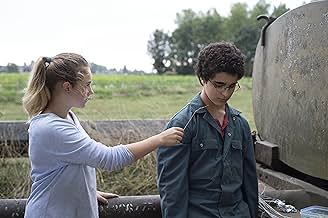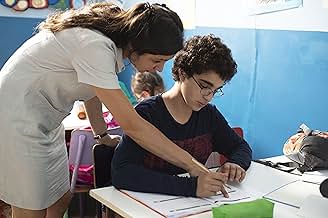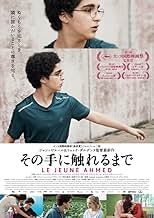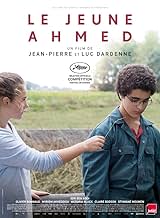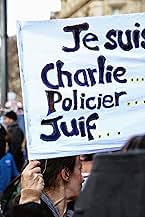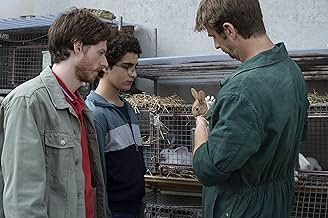AVALIAÇÃO DA IMDb
6,6/10
4,9 mil
SUA AVALIAÇÃO
Um adolescente belga trama um plano para matar seu professor depois de adotar uma interpretação extremista do Corão.Um adolescente belga trama um plano para matar seu professor depois de adotar uma interpretação extremista do Corão.Um adolescente belga trama um plano para matar seu professor depois de adotar uma interpretação extremista do Corão.
- Direção
- Roteiristas
- Artistas
- Prêmios
- 5 vitórias e 12 indicações no total
Eva Zingaro
- Psychologue du centre
- (as Eva Zingaro-Meyer)
- Direção
- Roteiristas
- Elenco e equipe completos
- Produção, bilheteria e muito mais no IMDbPro
Avaliações em destaque
Le Jeune Ahmed is not just another movie about radicalism, misogyny, or going down the wrong path. As in life, the reality is far more complex and the Dardenne brothers understand that deeply. They are masters at portraying subtle, everyday life; not overly dramatic, but rich in nuance and emotional truth.
It's no different here. The film begins with the deeply unsettling unraveling of a boy who believes he must hate his teacher. Brainwashed by his imam, he follows a path of destruction. Yet when he's caught and placed under the care of the state, a shift begins. Removed from his known environment, he's sent to work on a farm, where he meets a girl his own age. What begins as a typical "girl-meets-boy" situation takes an unexpected turn: unlike the usual teenage story, Ahmed is torn between the hate he was conditioned into, and the unfamiliar feelings of mutual attraction and connection.
Le Jeune Ahmed is far too subtle and socially engaged to become a simplistic tale of good versus evil. Life isn't simple and this film doesn't pretend it is. This is no Hollywood redemption arc. The Dardenne brothers deliver a beautifully restrained yet emotionally charged drama that lingers long after it ends.
It's no different here. The film begins with the deeply unsettling unraveling of a boy who believes he must hate his teacher. Brainwashed by his imam, he follows a path of destruction. Yet when he's caught and placed under the care of the state, a shift begins. Removed from his known environment, he's sent to work on a farm, where he meets a girl his own age. What begins as a typical "girl-meets-boy" situation takes an unexpected turn: unlike the usual teenage story, Ahmed is torn between the hate he was conditioned into, and the unfamiliar feelings of mutual attraction and connection.
Le Jeune Ahmed is far too subtle and socially engaged to become a simplistic tale of good versus evil. Life isn't simple and this film doesn't pretend it is. This is no Hollywood redemption arc. The Dardenne brothers deliver a beautifully restrained yet emotionally charged drama that lingers long after it ends.
At first I want to establish a few things, first that I'm a Muslim person who live in an Islamic country which is Egypt, the second is that I like The Dardennes' cinematic language and I liked (Deux jours, une nuit) so much.
There is no actual plot, the movie is just going nowhere and doesn't follow the three acts structure. The movie is a character study movie but our main character is such a flat, unrealistic and caricature character. How can a kid be like that? How can a kid have this kind of thoughts? How can a kid have this cruelty? How can a kid have this insist on doing this kind of a violent act? It was a flat character who didn't change too much from the beginning to the end. The movie represents the idea of accepting people even if they tried to hurt you, but why did the Dardenne brothers put Muslims as the bad guys? Actually why are we treated as the bad guys from everyone? Bin-Laden? come on look at Hitler or Stallin. Whatever we are the stereotype of violence now so why do I whine.
The Dardenne brothers still have their cinematic tools like the long takes, shaky camera and not using a music. And like I said I liked it in (Deux jours, une nuit) But in this movie actually these tools made the movie slow paced and boring most of the time.
At the end I didn't like the movie at all, It wasn't entertaining and its ideas were biased.
There is no actual plot, the movie is just going nowhere and doesn't follow the three acts structure. The movie is a character study movie but our main character is such a flat, unrealistic and caricature character. How can a kid be like that? How can a kid have this kind of thoughts? How can a kid have this cruelty? How can a kid have this insist on doing this kind of a violent act? It was a flat character who didn't change too much from the beginning to the end. The movie represents the idea of accepting people even if they tried to hurt you, but why did the Dardenne brothers put Muslims as the bad guys? Actually why are we treated as the bad guys from everyone? Bin-Laden? come on look at Hitler or Stallin. Whatever we are the stereotype of violence now so why do I whine.
The Dardenne brothers still have their cinematic tools like the long takes, shaky camera and not using a music. And like I said I liked it in (Deux jours, une nuit) But in this movie actually these tools made the movie slow paced and boring most of the time.
At the end I didn't like the movie at all, It wasn't entertaining and its ideas were biased.
YOUNG AHMED
The justifiably renowned Dardenne Brothers won the Cannes Directing prize for YOUNG AHMED, but, it isn't one of their stronger films, despite some interesting thematic elements. Ahmed (Idir Ben Addi) is a teenage Muslim in Belgium who, under the influence of a radical Imam (Othmane Moumen ) becomes increasingly strict in his religious practices putting him at odds with the more open ways of his school and even his own family (neither his mother (Claire Bodson) or sister wear hijabs). When Ahmed puts his radical thoughts into action he is placed in a youth detention/rehabilitation center. It is there that the bulk of the brief 84 minute picture is set, and where Ahmed continues to struggle finding his way between his ultra-conservative and strict principles, and adapting to the modern world. Much of the criticism of the Dardennes has been that it doesn't provide enough answers about Ahmed. Throughout their distinguished careers, the brothers have never been ones to provide easy conclusions, they are most adept at posing questions and challenging the viewer. What keeps YOUNG AHMED from fully succeeding is that in their best work (ROSETTA, L'ENFANT) the directing team finds a way to provide a strong dramatic narrative to pose their queries. Here, Ahmed's tale, while well documented, fails to fully engage. The movie has moments, but, they are fleetingly effective.
The justifiably renowned Dardenne Brothers won the Cannes Directing prize for YOUNG AHMED, but, it isn't one of their stronger films, despite some interesting thematic elements. Ahmed (Idir Ben Addi) is a teenage Muslim in Belgium who, under the influence of a radical Imam (Othmane Moumen ) becomes increasingly strict in his religious practices putting him at odds with the more open ways of his school and even his own family (neither his mother (Claire Bodson) or sister wear hijabs). When Ahmed puts his radical thoughts into action he is placed in a youth detention/rehabilitation center. It is there that the bulk of the brief 84 minute picture is set, and where Ahmed continues to struggle finding his way between his ultra-conservative and strict principles, and adapting to the modern world. Much of the criticism of the Dardennes has been that it doesn't provide enough answers about Ahmed. Throughout their distinguished careers, the brothers have never been ones to provide easy conclusions, they are most adept at posing questions and challenging the viewer. What keeps YOUNG AHMED from fully succeeding is that in their best work (ROSETTA, L'ENFANT) the directing team finds a way to provide a strong dramatic narrative to pose their queries. Here, Ahmed's tale, while well documented, fails to fully engage. The movie has moments, but, they are fleetingly effective.
Summary
In the current context of the resurgence of neo-fascism and with a World Cup about to be held in a misogynistic and homophobic Islamic theocracy, it is opportune to see the 2018 film in which the Dardenne brothers bravely tackled Muslim youth fundamentalism, establishing a successful cross between the psychology of the solitary leading character, the context in which he moves and certain precepts of Islam, without this being relativized or blurred.
The women act as disturbers, opponents and challengers of Islam's religious and macho misogyny embodied in the impenetrable, resolute, fanatical and tenacious teenager Ahmed, a young out-of-place radical for whom violence ends up being as natural as it is inevitable.
Review
The film follows Ahmed, a Muslim teenager from a Belgian village, who does not hesitate to resort to violence based on his interpretation of the imam's teachings on him and the Koran.
This time the Dardenne brothers face a thorny issue, and they do it frankly and without fear. I say without fear because they do not fear that by addressing the issue of Islamic fundamentalism they will be branded as Islamophobes.
The film rightly establishes a cross between the psychology of the character, the context in which he moves and certain precepts of Islam, but without this being relativized or blurred by the former. They are three dimensions that enhance each other.
There is an inevitable clash (and some irony) between the secularism of the Belgian public school and the objections of some Muslim parents who oppose for religious reasons the proposals of Ahmed's teacher of Arab origin.
An important aspect that went unnoticed by the critics is the centrality in the history of women as threats, opponents and challengers of Islam's religious and sexist misogyny, as representatives of evil that must be avoided, combated and even eliminated. It is the female figures (the mother, the sister, his teacher Inés and another that I will not reveal) who assume the destabilizing role of an Ahmed who combines his fear of female contact with a religious precept that demonizes him, while the Imam Youssuf assumes the role of the absent father, guarantor of the rules, whose teachings the young man combines with those of a religious leader who follows the web.
Another interesting aspect is that The Young Ahmed does not follow the process of religious radicalization of the adolescent, but rather the character is already approached with such a degree of fanaticism that it only remains for him to take him to the field of a violence that is as natural as it is inevitable for him. On the other hand, he is illustrative of how the system faces and seeks to redirect these situations, emphasizing respect and containment.
The Dardenne resort to their usual dry tone, with handheld camera moments that reinforce a realism supported by the presence of actors unknown to the general public. Idir Ben Addi assumes the difficult and at times unpleasant role of an impenetrable, determined, fanatical and tenacious adolescent, with an opacity that sustains an unpredictability that adds elements of a thriller to the psychological and social drama, in a story that is even more disturbing to present to us. To an unincorporated fundamentalist who acts completely on his own.
In the current context of the resurgence of neo-fascism and with a World Cup about to be held in a misogynistic and homophobic Islamic theocracy, it is opportune to see the 2018 film in which the Dardenne brothers bravely tackled Muslim youth fundamentalism, establishing a successful cross between the psychology of the solitary leading character, the context in which he moves and certain precepts of Islam, without this being relativized or blurred.
The women act as disturbers, opponents and challengers of Islam's religious and macho misogyny embodied in the impenetrable, resolute, fanatical and tenacious teenager Ahmed, a young out-of-place radical for whom violence ends up being as natural as it is inevitable.
Review
The film follows Ahmed, a Muslim teenager from a Belgian village, who does not hesitate to resort to violence based on his interpretation of the imam's teachings on him and the Koran.
This time the Dardenne brothers face a thorny issue, and they do it frankly and without fear. I say without fear because they do not fear that by addressing the issue of Islamic fundamentalism they will be branded as Islamophobes.
The film rightly establishes a cross between the psychology of the character, the context in which he moves and certain precepts of Islam, but without this being relativized or blurred by the former. They are three dimensions that enhance each other.
There is an inevitable clash (and some irony) between the secularism of the Belgian public school and the objections of some Muslim parents who oppose for religious reasons the proposals of Ahmed's teacher of Arab origin.
An important aspect that went unnoticed by the critics is the centrality in the history of women as threats, opponents and challengers of Islam's religious and sexist misogyny, as representatives of evil that must be avoided, combated and even eliminated. It is the female figures (the mother, the sister, his teacher Inés and another that I will not reveal) who assume the destabilizing role of an Ahmed who combines his fear of female contact with a religious precept that demonizes him, while the Imam Youssuf assumes the role of the absent father, guarantor of the rules, whose teachings the young man combines with those of a religious leader who follows the web.
Another interesting aspect is that The Young Ahmed does not follow the process of religious radicalization of the adolescent, but rather the character is already approached with such a degree of fanaticism that it only remains for him to take him to the field of a violence that is as natural as it is inevitable for him. On the other hand, he is illustrative of how the system faces and seeks to redirect these situations, emphasizing respect and containment.
The Dardenne resort to their usual dry tone, with handheld camera moments that reinforce a realism supported by the presence of actors unknown to the general public. Idir Ben Addi assumes the difficult and at times unpleasant role of an impenetrable, determined, fanatical and tenacious adolescent, with an opacity that sustains an unpredictability that adds elements of a thriller to the psychological and social drama, in a story that is even more disturbing to present to us. To an unincorporated fundamentalist who acts completely on his own.
Over the last twenty years, the Dardenne brothers' ("The Unknown Girl") social realist dramas about the forgotten and the marginalized have been honored at the Cannes Film Festival with two Palme d'Ors, two Best Performance awards, one Best Screenplay award, and one Grand Prix. Their magic is still in evidence in their latest film, Young Ahmed, which won them the award for Best Director this year at Cannes. While it is a small film on a very big subject - that of Islamic fundamentalism - the film manages to deliver a thought-provoking and involving experience in spite of its 84-minute length and the broad scope of its subject.
Set in a small town in Belgium, a country that has endured recent terrorist attacks, the film belongs to first-time actor Idir Ben Addi who delivers a remarkable performance as Ahmed, a studious-looking, bespectacled 13-year-old boy whose hangdog appearance and inarticulateness masks his devotion to a fundamentalist religious philosophy that takes no prisoners. With his youth and malleability, his growing adherence to what he considers to be a true Muslim is fostered by his relationship with a local imam, Youssouf (Othmane Moumen, "Bad Buzz") who rails at what he considers to be the growing secular attack on Islam.
Without a father in the home to guide him, Ahmed personifies those whose obsession with ideology blinds them to their own humanity and that of others, taking on the imam's "us versus them" attitude even when it comes to his family. He calls his sister a "slut" because of the casual way she dresses and berates his mother (Claire Bodson, "Our Children") for drinking wine and not wearing a hijab. Apparently, Ahmed's transformation is recent since his mother laments the fact that just last year all he thought about were video games, but we do not know what triggered Ahmed's transformation and the film does not pursue it.
We do know, however, that he is burdened by the memory of his cousin who apparently took his own life as a suicide bomber, a fact that the imam will not let him forget. The teenager's main source of conflict is with his teacher Inès (Myriem Akheddiou, "The Kid with a Bike"). He refuses to shake her hand because he thinks women are impure and because she is dating a person of the Jewish faith. He is also upset about her plans to use music to teach Arabic and the Quran, plans that he considers sacrilegious. Labeled by the imam as an apostate, the impressionable teenager tries to prove his faith by physically assaulting her, an action for which he is placed in juvenile custody. Even this is too much for the imam who tells Ahmed that he said to oppose her beliefs, not try to kill her.
At the juvenile facility, Ahmed is treated with respect by his caseworker, psychologist, and teachers, but the viewer is left probing for clues as to whether Ahmed regrets his actions and is willing to change or whether he is quietly planning another assault. As part of his rehabilitation, he is sent to a farm where he is befriended by Louise (Victoria Bluck), the young daughter at the farm, but even her kiss does not awaken in him a feeling for people who have a different outlook on life. While Young Ahmed centers on the fundamentalist tenets of one religion, the film is not an attack on Islam but an assertion that any idea which considers itself to be the only true belief is antithetical to long-established ideals of tolerance and religious freedom.
Ultimately, no words or actions of others seem to reach Ahmed. As director Jean-Pierre Dardenne put it, "Fanatics don't listen to the outside world; they build a wall between themselves and the world. Their only goal is for others to become like them, no matter the cost." Though the direction in which Ahmed is headed is unclear, it is in the moment when his body deserts him that we get a hint he knows that his only escape from the bondage of ideology is to discover the true nature of his own being and that his only loss will be that which has stood in the way of his deeper understanding of the world.
Set in a small town in Belgium, a country that has endured recent terrorist attacks, the film belongs to first-time actor Idir Ben Addi who delivers a remarkable performance as Ahmed, a studious-looking, bespectacled 13-year-old boy whose hangdog appearance and inarticulateness masks his devotion to a fundamentalist religious philosophy that takes no prisoners. With his youth and malleability, his growing adherence to what he considers to be a true Muslim is fostered by his relationship with a local imam, Youssouf (Othmane Moumen, "Bad Buzz") who rails at what he considers to be the growing secular attack on Islam.
Without a father in the home to guide him, Ahmed personifies those whose obsession with ideology blinds them to their own humanity and that of others, taking on the imam's "us versus them" attitude even when it comes to his family. He calls his sister a "slut" because of the casual way she dresses and berates his mother (Claire Bodson, "Our Children") for drinking wine and not wearing a hijab. Apparently, Ahmed's transformation is recent since his mother laments the fact that just last year all he thought about were video games, but we do not know what triggered Ahmed's transformation and the film does not pursue it.
We do know, however, that he is burdened by the memory of his cousin who apparently took his own life as a suicide bomber, a fact that the imam will not let him forget. The teenager's main source of conflict is with his teacher Inès (Myriem Akheddiou, "The Kid with a Bike"). He refuses to shake her hand because he thinks women are impure and because she is dating a person of the Jewish faith. He is also upset about her plans to use music to teach Arabic and the Quran, plans that he considers sacrilegious. Labeled by the imam as an apostate, the impressionable teenager tries to prove his faith by physically assaulting her, an action for which he is placed in juvenile custody. Even this is too much for the imam who tells Ahmed that he said to oppose her beliefs, not try to kill her.
At the juvenile facility, Ahmed is treated with respect by his caseworker, psychologist, and teachers, but the viewer is left probing for clues as to whether Ahmed regrets his actions and is willing to change or whether he is quietly planning another assault. As part of his rehabilitation, he is sent to a farm where he is befriended by Louise (Victoria Bluck), the young daughter at the farm, but even her kiss does not awaken in him a feeling for people who have a different outlook on life. While Young Ahmed centers on the fundamentalist tenets of one religion, the film is not an attack on Islam but an assertion that any idea which considers itself to be the only true belief is antithetical to long-established ideals of tolerance and religious freedom.
Ultimately, no words or actions of others seem to reach Ahmed. As director Jean-Pierre Dardenne put it, "Fanatics don't listen to the outside world; they build a wall between themselves and the world. Their only goal is for others to become like them, no matter the cost." Though the direction in which Ahmed is headed is unclear, it is in the moment when his body deserts him that we get a hint he knows that his only escape from the bondage of ideology is to discover the true nature of his own being and that his only loss will be that which has stood in the way of his deeper understanding of the world.
Você sabia?
- CuriosidadesThis movie was selected to compete for the Palme d'Or at the 2019 Cannes Film Festival, where it eventually won the Best Director Award, marking the first time the award was officially shared by a directing duo winning for a single film (although Joel Coen has won the award three times for movies he co-directed with his brother Ethan Coen where Ethan had to go uncredited per DGA rules).
- Trilhas sonorasDelay
Performed by Intergalactic Lovers
Principais escolhas
Faça login para avaliar e ver a lista de recomendações personalizadas
- How long is Young Ahmed?Fornecido pela Alexa
Detalhes
- Data de lançamento
- Países de origem
- Central de atendimento oficial
- Idiomas
- Também conhecido como
- Young Ahmed
- Locações de filme
- Rue Chapuis 37, Seraing, Liège, Wallonia, Bélgica(Graines de Génie tutoring school)
- Empresas de produção
- Consulte mais créditos da empresa na IMDbPro
Bilheteria
- Faturamento bruto nos EUA e Canadá
- US$ 21.291
- Fim de semana de estreia nos EUA e Canadá
- US$ 4.216
- 23 de fev. de 2020
- Faturamento bruto mundial
- US$ 1.522.606
- Tempo de duração
- 1 h 25 min(85 min)
- Cor
- Proporção
- 1.85 : 1
Contribua para esta página
Sugerir uma alteração ou adicionar conteúdo ausente

![Assistir a Bande-annonce [OV]](https://m.media-amazon.com/images/M/MV5BM2RiNjYyN2MtNTdhOC00MmQxLWIwYmItNzE1YjkyMjkxYTk0XkEyXkFqcGdeQXRyYW5zY29kZS13b3JrZmxvdw@@._V1_QL75_UX500_CR0)

